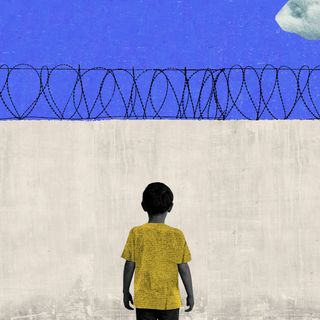Pope Francis on Sunday night condemned domestic violence against women in harsh terms, in a television broadcast on an Italian network. “The problem is that, for me, it is almost satanic because it is taking advantage of a person who cannot defend herself, who can only [try to] block the blows,” he said. “It is humiliating. Very humiliating.”
Although the Pope spoke against domestic violence earlier — specifically noting its rise during the pandemic — Sunday night’s broadcast makes it the strongest condemnation of the practice yet, Reuters reported. As a religious leader and head of state, the Pope’s words carry a lot of weight. In terms of figures, they can influence approximately 1.35 billion follower-believers around the world.
A 2014 Pew Research survey found that a majority of people in the world view Pope Francis favorably. Although in India, 61% of those surveyed did not have an opinion at all, this is likely to have changed of late, particularly in light of recent, highly publicized meetings between the Prime Minister and the Pope.
A 2015 survey, also by the Pew Research Center, found that Pope Francis, in particular, finds more favorability across the political spectrum as compared to his predecessors, and is influential in people’s favorable opinion of the Catholic Church as well.
The survey results speak to the significance of his influence. India’s Christian Catholic population — standing at around 2.8 million people — is the third-largest religious group in India after Hindus and Muslims. In a context where religious elders have the power to influence behavior through their preachings, this statement has an impact.
A series on Gender and Christianity in The Conversation noted that evangelical sermons would often emphasize submitting to a husband’s authority, as part of “God’s plan.” “[S]he [a survivor] told me that when she went to her church leaders for support, they asked her what she was doing wrong. When she attempted to escape the abuse after the first decade of marriage, they told her to continue attending church with her husband,” wrote Vicki Lowik and Annabel Taylor, in this series.
Related on The Swaddle:
India’s Domestic Violence Laws Don’t Protect Couples Who Live Apart, Leaving Them Vulnerable and Stigmatized
An ABC investigation, moreover, found that church leaders often enable and conceal domestic violence against women. “When we speak of domestic violence, and the cultural factors that foment it, one crucial element missing from the discussion has been religion,” write Julia Baird and Hayley Gleeson.
Religion, in general, being a male-dominated space may have a role to play. A 2015 Lancet study found that “norms related to male authority over female behavior” are predictive of intimate partner violence across geographies. Literal interpretations of the Bible, moreover, can protect “perpetrators of domestic violence while simultaneously heaping shame and scorn upon its victims,” noted one Catholic bishop from Australia.
Feminist critiques of Christian theology have sought to reclaim “androcentric” interpretations of the Bible that have prevailed for a long time, fuelling domestic abuse in the name of god. “…an androcentric interpretation of God is a false concept that dehumanizes women and perpetuates their experiences of domestic abuse,” writes Ally Moder, a survivor of domestic violence and a feminist Christian theologian.
Some feminist theologians have also pointed out the sexism and patriarchal bias in “God-language,” emphasizing the need to reconstruct the narrative. Feminist theologians join a tradition of feminist reclamations of religion away from patriarchal interpretations of scriptures used to justify violence and misogyny.
The Pope’s statement is thus powerful and influential, because it specifically uses religious language and goes against the grain of misogynist interpretations of scripture, and are in line what with feminists have been arguing for a long time.




